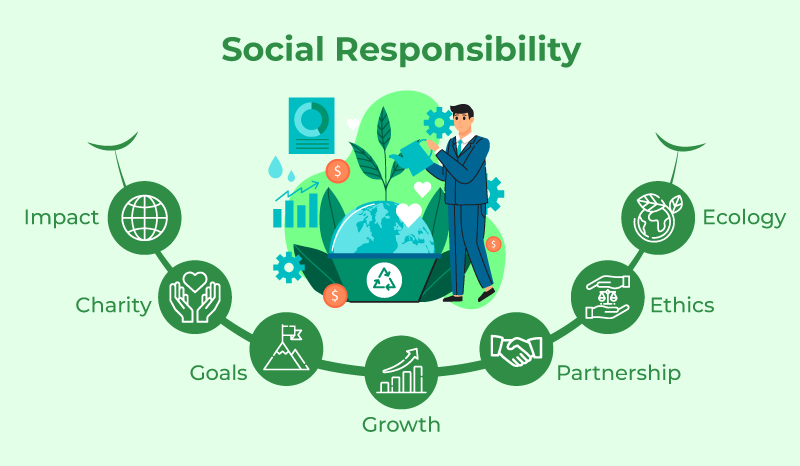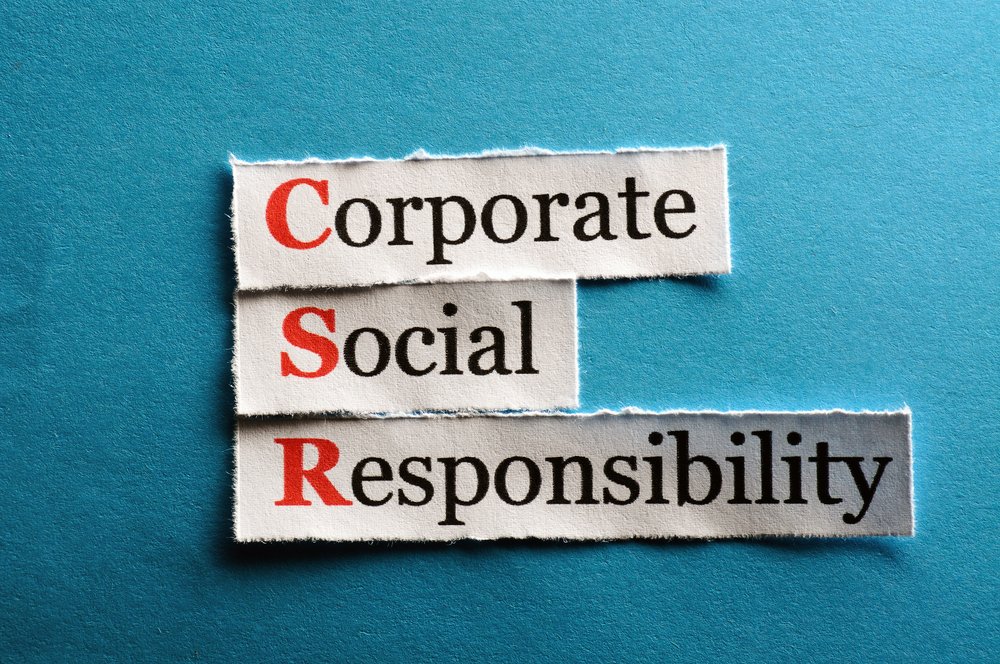Corporate Social Responsibility (CSR) brings numerous benefits to businesses, making it a strategic investment rather than just an ethical obligation. Here are some key advantages:
- Enhanced Reputation: CSR initiatives can improve a company’s image and brand value. Consumers today prefer companies that contribute positively to society. As Warren Buffet once said, “It takes 20 years to build a reputation and five minutes to ruin it.” Companies that actively engage in CSR build trust and loyalty.
- Increased Customer Loyalty: Customers are more likely to support brands aligned with their values. When businesses address social and environmental concerns, they foster a loyal customer base. Brands like Patagonia have built entire business models on sustainable practices, which resonate deeply with eco-conscious consumers.
- Attracting and Retaining Talent: Employees, especially millennials and Gen Z, are drawn to companies that prioritize social responsibility. An organization with a strong CSR strategy can attract top talent and increase employee satisfaction, leading to lower turnover rates.
- Operational Efficiency and Cost Savings: Implementing sustainable practices often results in cost savings, such as reducing energy consumption or waste. It’s a win-win situation where businesses help the environment while also improving their bottom line.
- Risk Management and Long-Term Viability: Engaging in responsible practices helps businesses mitigate risks related to regulatory changes, market shifts, or environmental concerns. It ensures long-term sustainability and prepares companies for future challenges.
- Positive Investor Relations: Investors are increasingly interested in socially responsible companies. A strong CSR program can attract socially conscious investors and open new funding opportunities.

In summary, CSR is not just a moral choice but a smart business strategy. As the famous economist Milton Friedman once controversially argued, “The business of business is business.” However, in today’s interconnected world, businesses that thrive are those that do more than just focus on profits; they contribute meaningfully to society.
Corporate Social Responsibility (CSR) has evolved from being a “nice-to-have” to a strategic necessity for businesses in today’s socially conscious world. By aligning a company’s values with societal expectations, businesses are not only contributing positively to their communities but also driving growth and sustainability. Here are some expanded benefits of CSR for businesses:
1. Improved Brand Image and Reputation
Businesses known for ethical practices are often perceived more positively by the public. A well-executed CSR strategy can significantly enhance a company’s image, leading to stronger brand recognition. Companies like Ben & Jerry’s and TOMS have successfully integrated CSR into their core brand, earning them widespread support and advocacy from consumers who care about issues like fair trade, sustainability, and social justice.
Example: In 2018, Starbucks committed to hiring 10,000 refugees worldwide as part of its CSR initiative. While the company faced some backlash, it also garnered global praise and reinforced its image as a socially responsible brand that aligns with global humanitarian values.
2. Increased Customer Loyalty and Trust
Consumers are increasingly conscious of the impact businesses have on society. According to Nielsen’s Global Corporate Sustainability Report, 66% of global consumers are willing to pay more for products from companies committed to positive social and environmental impact. This demonstrates that businesses with strong CSR programs can foster deep trust and long-term loyalty among their customer base.
Example: Companies like Lush, which produce cosmetics using ethically sourced ingredients, have built a loyal following by being transparent about their supply chain and sustainable practices.

3. Better Employee Engagement and Retention
Employees are more engaged and motivated when they feel that their company aligns with their values. A Deloitte study found that 70% of millennials said a company’s commitment to social responsibility influences their decision to stay with an organization. CSR initiatives can help boost morale, improve job satisfaction, and retain top talent, especially in competitive industries.
Example: Google encourages employee involvement in its CSR activities by offering them the opportunity to participate in volunteer programs and initiatives like the Google Green Program, which promotes sustainability. This not only enhances employee satisfaction but also positions Google as a desirable employer.
4. Attracting Investment and Partnerships
Investors today are increasingly focusing on Environmental, Social, and Governance (ESG) criteria when evaluating companies. Businesses that are known for strong CSR practices tend to attract investment from socially conscious investors and funds. Sustainable investing has grown exponentially, and businesses that ignore CSR could miss out on substantial capital opportunities.
Example: BlackRock, one of the world’s largest asset management firms, made headlines when its CEO, Larry Fink, urged businesses to focus on sustainability or risk losing their investment backing.

5. Operational Efficiency and Resource Conservation
CSR programs focused on environmental sustainability often lead to operational efficiency. By adopting eco-friendly practices, companies can reduce waste, save energy, and decrease operational costs. This contributes to a better financial bottom line while reducing environmental footprints.
Example: Walmart, as part of its CSR initiatives, committed to reducing its greenhouse gas emissions and minimizing packaging waste. These efforts not only saved Walmart millions in operational costs but also boosted its reputation as a responsible corporate citizen.
6. Access to New Markets
CSR opens the door to new markets, especially in regions where businesses that invest in community development are welcomed. Companies that address social issues such as poverty, education, and healthcare in emerging economies often gain access to untapped markets and create lasting relationships within those communities.
Example: Unilever’s Sustainable Living Plan focuses on improving the health and well-being of over a billion people while also reducing its environmental impact. This plan has expanded Unilever’s reach into developing markets and created new growth opportunities.

7. Reduced Regulatory Scrutiny
Companies that proactively engage in CSR may face less scrutiny from regulators. Governments often reward businesses that meet or exceed legal standards by offering incentives, such as tax breaks or subsidies, for their contributions to societal goals, particularly in areas like sustainability and community development.
Example: Companies investing in renewable energy or reducing their carbon footprint often benefit from government incentives and reduced regulatory hurdles, improving both their financial standing and public perception.
8. Innovation and Competitive Advantage
Embracing CSR can spark innovation as businesses look for new ways to reduce their environmental impact, improve working conditions, or address social problems. This focus on doing good often leads to product or service innovations that give companies a competitive edge in their industry.
Example: Tesla’s focus on clean energy and sustainable transport has not only disrupted the automotive industry but also positioned it as a leader in the green revolution. Its commitment to innovation and environmental stewardship has drawn eco-conscious consumers and investors alike.
9. Improved Financial Performance
Contrary to the belief that CSR is a cost center, numerous studies have shown that companies that actively engage in CSR outperform their peers financially. By creating value for society, companies can generate more revenue, increase customer engagement, and reduce costs over the long term.
Example: Research by Harvard Business School shows that companies with strong sustainability practices perform better in terms of return on assets (ROA) and return on equity (ROE) over the long run compared to those without such practices.

10. Crisis Management and Resilience
In times of crisis, companies with strong CSR initiatives are often better equipped to navigate challenges. A robust CSR strategy can help businesses manage reputational risks and maintain customer loyalty during periods of economic, social, or environmental uncertainty.
Example: During the COVID-19 pandemic, many companies that engaged in CSR, such as those providing support to frontline workers or donating to healthcare initiatives, were seen in a more favorable light compared to those that didn’t take action, helping them maintain brand loyalty.
Conclusion
Corporate Social Responsibility is no longer an optional extra for businesses—it’s essential for long-term success. Companies that integrate CSR into their core strategy not only benefit society but also enhance their reputation, build stronger relationships with stakeholders, drive innovation, and achieve sustainable growth. In an increasingly interconnected and conscious global market, businesses that prioritize CSR are positioned to thrive in the future.



